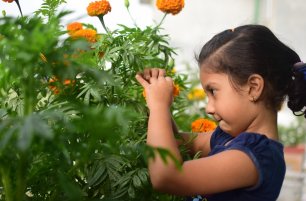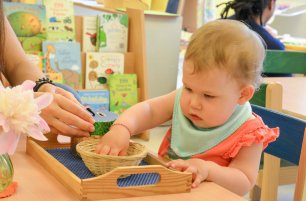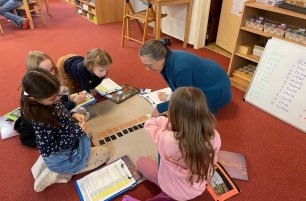Absorbent Mind – A Key Principle In Montessori
As parents and members of a Montessori community, we often hear this term. But what do Montessori educators really mean by it?
WHAT IS THE ABSORBENT MIND?
In Maria Montessori’s book The Absorbent Mind, she describes the special intelligence young children have during the first six years of life. Through interacting with their environment, they learn information and skills rapidly and in a seemingly effortless way; as we get older, acquiring new information and skills becomes much more of a challenge. Compare an adult trying to learn a new language to a young child learning multiple languages within the first years of life – the difference is quite obvious!
THE ROLE OF THE ENVIRONMENT
A child is curious and naturally drawn to explore their surroundings. In other words, the child gains their knowledge simply by living, observing, and interacting with their environment. The child is unconsciously learning during the years from birth to three, and then from the age of three to six is when conscious working begins. Children during these early years need a rich environment full of opportunities for language, gross and fine motor development. This environment must change and adapt as the child grows in order to best meet the needs of the child during every stage of life.
UNCONSCIOUS LEARNING FROM BIRTH TO THREE
Maria Montessori believed that through daily life a child takes in information without effort and absorbs all aspects of their culture. During these first three years, the child develops the ability to move, communicate, orient themselves in their environment, and they start to create a sense of order and a sense of self. Children use their environment to construct themselves as unique human beings specific to their time and place in the world. They learn everything about their culture in these first three years. Take language, for instance, a bilingual or multilingual child not only learns how to understand and speak different languages at a very young age but they also unconsciously know when to switch languages based on who they are talking to!
MOVEMENT AS THE KEY TO DEVELOPMENT
We can see another example of how the absorbent mind works when we look at movement. A child is born into the world with very little capabilities but within a relatively short time, the child naturally adapts himself to physically navigate the world around him. This directed movement comes from months of unconscious processing of information so that once the child has gained enough physical strength and the capability to move himself then he knows where he wants to go or what he wants to do. The child is developing their social skills, spatial understanding, and self-awareness, as well as their preferences, beliefs, and patterns all because of the absorbent mind.
HOW CAN ADULTS SUPPORT THE WORK OF THE ABSORBENT MIND?
We must realize the importance of this critical time and recognize that we play an important role in the child’s development. Children are constantly absorbing the information around them and learning about their environment so it’s really important to be careful what we expose them to. We don’t know how this information will come out later in life. We must be mindful at all times because children are watching all of our behaviors and listening to our language. We can help our children by being positive role models and setting good examples. Everything learned during this time makes you the person you are today and this is one of the secrets of childhood – we don’t know what is going to come from what is learned.

CREATING A FOUNDATION OF FUTURE PERSONALITY
The importance of this period of life cannot be stressed enough as it is during this stage of development that fundamental aspects of the human being, such as personality traits and beliefs, are being constructed. This builds a foundation that will create the adult that the child will one day become. As parents and educators, it is our responsibility to help and support children along their journey. We can do this by offering gentle support, showing and modeling proper behaviors and practices, and creating a safe and nurturing environment for the child to develop their skills and sense of self-worth.
by Lindsey Taylor
Want to learn more? Read our next article:









